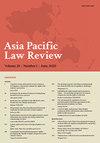The Financial Action Task Force entrapped within hypocrisy and rhetoric: using India as a case study
IF 1.7
4区 社会学
Q2 LAW
引用次数: 0
Abstract
ABSTRACT This paper discusses the FATF and its relationship with other normative frameworks (security, human rights), and actors (states, private institutions, civil society). It explains how the FATF, was appropriated willingly by states, beyond the peer-pressure, or financial repercussions explanations. It finds that one of these reasons was that states could use them to their own benefit through ‘rhetorical adaptation’. At the same time, it explains that the FATF’s frameworks go beyond merely being ‘vague and broad’; they are erroneous in terms of their methodology and contradict certain human rights such as the freedom of association, and the rights to due procedure. To illustrate this, it takes the case of India which has been coerced by the FATF to amend its security legislations to comply with its standards, but which has also instrumentally used these standards against minorities and political dissenters – particularly those that have organized themselves into some form of association (a segment specifically identified by the FATF as being vulnerable to money laundering and financing terrorism). Despite drawing attention to these issues, the FATF continues to operate with empty promises, and the standards continue to be supported and endorsed by the UN mechanisms, in what would otherwise be ‘hypocrisy’. This is because the FATF and the UN too, operate within institutional and material limitations – in this case, that its primary members are states or (in fact) representatives of the states, for whom security and political expediency stand at the forefront. Under these circumstances, the organizational doublespeak is but necessary.金融行动特别工作组陷入伪善和花言巧语之中:以印度为案例研究
摘要本文讨论了FATF及其与其他规范性框架(安全、人权)和行为者(国家、私营机构、民间社会)的关系。它解释了FATF是如何被各国自愿挪用的,超越了同行的压力或财务影响的解释。研究发现,其中一个原因是,国家可以通过“修辞改编”来利用它们为自己谋利。同时,它解释说,FATF的框架不仅仅是“模糊和宽泛”;它们在方法上是错误的,与结社自由和正当程序权等某些人权相矛盾。为了说明这一点,印度受到FATF的胁迫,修改其安全立法以符合其标准,但该组织也对少数群体和政治异见者使用了这些标准,尤其是那些组织成某种形式的协会的人(FATF特别认定这一部分容易受到洗钱和资助恐怖主义的影响)。尽管引起了人们对这些问题的关注,FATF仍在空洞的承诺下运作,这些标准继续得到联合国机制的支持和认可,否则将是“虚伪的”。这是因为FATF和联合国也在体制和物质限制下运作——在这种情况下,其主要成员是国家或(事实上)国家代表,对他们来说,安全和政治利益是最重要的。在这种情况下,组织上的双关语是必要的。
本文章由计算机程序翻译,如有差异,请以英文原文为准。
求助全文
约1分钟内获得全文
求助全文

 求助内容:
求助内容: 应助结果提醒方式:
应助结果提醒方式:


